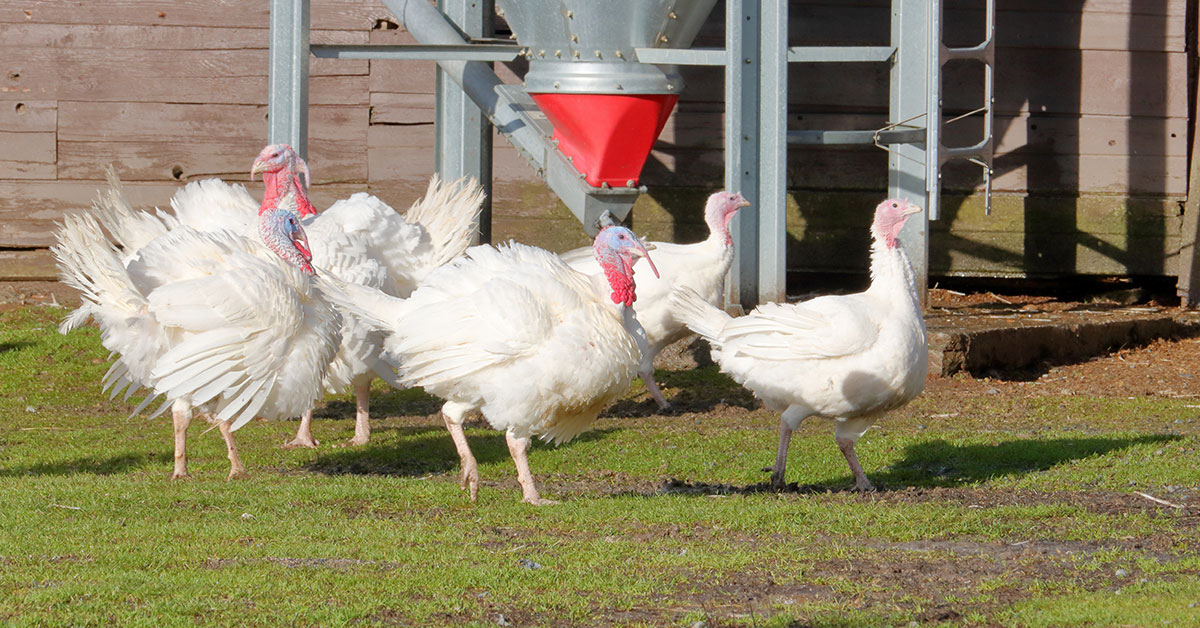The White Holland Turkey is a popular and, dare I say, majestic breed of domestic turkey. These birds are renowned for their striking all-white appearance and friendly disposition. In this article, we will explore the history, characteristics, and care requirements of the White Holland Turkey.
Appearance and Temperament
The White Holland Turkey is a large breed, with mature toms (males) weighing between 23 to 33 pounds and hens (females) between 12 to 16 pounds. They have a distinctive white plumage with a red head and neck. Their beaks and feet are also red. These turkeys have a broad chest, large body, and a fan-shaped tail.
White Holland Turkeys are known for their docile and friendly temperament, making them a popular choice for backyard flocks. They are easy to handle and enjoy human interaction. They are also known for their intelligence and curious nature, making them great pets.
Breed Origin
The White Holland Turkey originated not in Holland, but in the United States in the early 19th century. They were developed in the Hudson River Valley of New York state by crossing local domestic turkeys with European turkey breeds. The goal was to create a bird that had a larger size and was easier to raise than the wild turkeys of the time. The breed was named after the Dutch traders who first introduced turkeys to the United States.
Egg Production and Purpose
White Holland Turkeys are not as prolific egg layers as some other turkey breeds. Hens lay an average of 80 to 100 eggs per year, with eggs weighing about 80 grams each. The eggs are creamy white in color and have a longer incubation period of 28 days.
The primary purpose of the White Holland Turkey is as a meat bird. They are well-suited for commercial production due to their fast growth rate and large size. Their meat is flavorful, tender, and juicy.
Breeding White Holland Turkeys
Breeding White Holland Turkeys is relatively easy. The best method is to allow natural mating between a tom and a hen. However, artificial insemination can also be used for breeding. To ensure successful breeding, the ratio of toms to hens should be kept at one tom for every eight hens. It is also important to ensure that the birds are healthy and well-fed to improve their breeding success rate.
Incubating turkey eggs is the process of artificially hatching turkey eggs in a controlled environment, typically using an incubator. The incubation process typically takes around 28 days and requires consistent temperature, humidity, and ventilation to ensure successful hatching.
Caring for White Holland Turkeys
White Holland Turkeys are hardy birds that are well-suited for backyard flocks. They require a balanced diet of poultry feed, clean water, and fresh greens. It is also important to provide them with a safe and comfortable living environment that is protected from predators and the elements.
- Space: Turkeys require ample space to move around and spread their wings. Each bird should have at least 4-5 square feet of floor space. If you’re raising turkeys for meat, they will require more space.
- Protection: The housing should be predator-proof, with sturdy walls and a secure door that can be locked at night. Turkeys are vulnerable to attacks from predators like foxes, raccoons, and dogs.
- Roosting: Turkeys like to perch at night, so you should provide roosting poles or platforms. These should be at least 1-2 feet off the ground and sturdy enough to support the weight of the birds.
- Ventilation: The housing should be well-ventilated to prevent the buildup of moisture and ammonia. Proper ventilation will also help regulate the temperature inside the housing.
- Bedding: Provide plenty of clean, dry bedding for the turkeys to nest in. This can be straw, wood shavings, or other types of bedding material.
- Feeding and watering: Turkeys require access to clean water and a balanced diet. Make sure to provide them with fresh water and food daily.
White Holland Turkeys are social birds that enjoy human interaction, so it is important to spend time with them daily. Grooming is also essential to their care, as regular feather trimming and nail clipping can help prevent health problems.
White Holland Turkeys are a majestic and friendly breed of domestic turkey that is well-suited for backyard flocks. They have a striking appearance and are easy to care for, making them a popular choice for hobby farmers and poultry enthusiasts alike. With proper care and attention, White Holland Turkeys can provide years of enjoyment and delicious meat.

